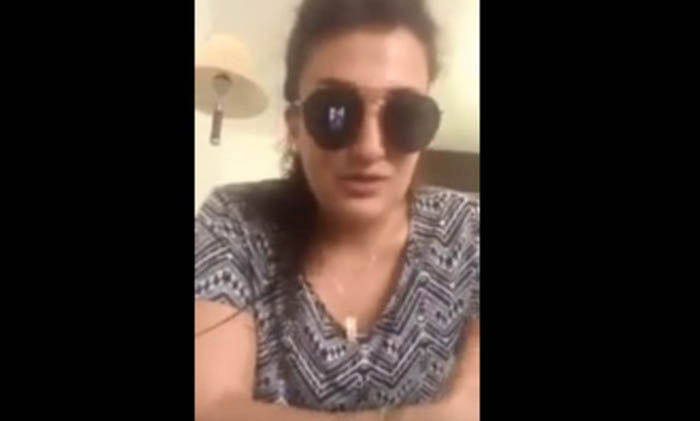Index relies entirely on the support of donors and readers to do its work.
Help us keep amplifying censored voices today.
[vc_row][vc_column][vc_column_text]

Screenshot from Mona el-Mazbouh’s apology video.
The below signatories express grave concern for the status of free speech and expression in Egypt. The authorities continue to openly silence anyone who is critical of the Egyptian government and of the state of affairs in Egypt. The arrest of Lebanese tourist Mona el-Mazbouh last month is yet another episode in President Abdel Fattah al-Sisi’s continued crackdown on rights and freedoms. We call for the immediate and unconditional release of Mona el-Mazbouh, who was sentenced to eight years in prison earlier this month.
Background
Lebanese Mona el-Mazbouh, 24, posted a 10-minute video to her Facebook account in May after she was allegedly sexually harassed, a lived reality that is experienced on a daily basis by most women in Egypt. The video included profanity against Egypt and Egyptians. Mona was stopped and arrested on 31 May at Cairo airport before leaving Egypt, after her video went viral on social media. Egyptian lawyer Amr Abdelsalam had filed a report against her with the general prosecution, accusing her of insulting the Egyptian people and the president. Abdelsalam has asked that she be added to the scores of Egyptians barred from leaving the country while her case remains open and until her sentence is completed, and to later permanently prevent her from entering the country.
The Egyptian attorney general ordered the immediate referral of Mona to an expedited criminal trial on 3 June for insulting the Egyptian people on social media. The prosecution accused Mona of “spreading false rumours that aim to harm society and defame religions, as well as creating inappropriate content and displaying it through her Facebook page”.
A Cairo misdemeanours court sentenced Mona to eight years in prison on 7 July for publishing a video with indecent content, defaming religion, insulting the Egyptian people and insulting the president. She was also fined EGP10,700 (around $598 USD).
Draconian laws that curtail free expression in Egypt
Accusations such as insulting the Egyptian people or the president are a serious transgression of the right to freedom of expression, which is guaranteed and protected by the Egyptian constitution and international human rights law. Over the past two years, there have been rapid and disturbing developments concerning the closure of physical and digital public spaces in Egypt, and an increased surveillance of social media and digital content.
A few weeks before Mona’s arrest, on 11 May, Egyptian activist Amal Fathy was arrested two days after she posted a video on Facebook condemning sexual harassment and disapproving of the government’s negligence on the issue. Fathy was charged with “disseminating a video on social media to publicly incite overthrowing the government”, “publishing a video that includes false news that could harm public peace”, and “misusing telecommunication tools”.
In addition, the Egyptian government continues to draft and approve laws that significantly curtail freedom of expression online, while heightening surveillance and censorship of social media users. On 5 June, Parliament approved the final draft of the new Cybercrime Law, titled “the Law on Combating Cybercrimes” that legalises broad censorship of the internet and facilitates comprehensive surveillance of communications.
Most recently, Parliament also approved a final reading a bill allowing authorities to monitor social media users and combat “fake news”, whereby individuals whose social media accounts have more than 5,000 followers could be placed under the supervision of Egypt’s Supreme Council for Media Regulations.
These developments reinforce the troubling and ongoing trend in Egypt of silencing public discourse and shrinking civic space that has now led to Mona’s arrest and detention.
Urgent action required
Before her arrest, Mona published a second video addressing the public response she received for the first. In her second video, Mona apologised for the content of the first, and clarified that she was not making a political statement and did not mention the Egyptian President at all in her initial video.
She was initially sentenced to 11 years in prison, however, her sentence was reduced to eight years after her lawyer provided the court with evidence that she “underwent a surgery in 2006 to remove a blood clot from her brain, which has impaired her ability to control anger”. Mona awaits her appeal date set for 29 July.
The below signatories believe that Mona el-Mazbouh’s arrest is a violation of her basic rights and freedoms, and connotes an even bigger threat to the general state of free expression in Egypt. We demand the immediate and unconditional release of Mona el-Mazbouh, and request that all charges be dropped allowing Mona to leave and enter Egypt freely.
Signed,
Association for Freedom of Thought and Expression (AFTE)
7amleh – Arab Center for the Advancement of Social Media
Adil Soz – International Foundation for Protection of Freedom of Speech
Africa Freedom of Information Centre (AFIC)
Article 19
Association of Caribbean Media Workers
Bahrain Center for Human Rights
Cairo Institute for Human Rights Studies (CIHRS)
Cartoonists Rights Network International (CRNI)
Electronic Frontier Foundation (EFF)
Freedom Forum
Human Rights Network for Journalists – Uganda (HRNJ-Uganda)
I’lam Arab Center for Media Freedom Development and Research
Independent Journalism Center (IJC)
Index on Censorship
Maharat Foundation
March
Mediacentar Sarajevo
Media Institute of Southern Africa (MISA)
Pacific Islands News Association (PINA)
Pen American Center
Pen Canada
Social Media Exchange (SMEX)
South East Europe Media Organisation
Vigilance for Democracy and the Civic State
Visualizing Impact (VI)[/vc_column_text][/vc_column][/vc_row][vc_row][vc_column][vc_basic_grid post_type=”post” max_items=”4″ element_width=”6″ grid_id=”vc_gid:1532684122469-2df2f596-084e-2″ taxonomies=”147″][/vc_column][/vc_row]